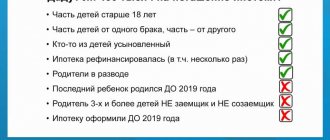Large family: what is it?
A large family is a family in which three or more minor children are raised. But this rule does not apply throughout the country.
The Russian people consist of many nationalities that have their own culture and traditions. Decree of the President of the Russian Federation of May 5, 1992 No. 431 clause 1 allows local authorities to determine criteria for large families at the regional level. Such a competent approach allows us to solve specific problems of large families at the local level.
Let's take the regions that are leaders in birth rates. They do not need financial incentives for fertility. In Tyva, a family was considered large after the birth of the fourth child, and in Ingushetia, a family could receive the status of large only after the birth of the fifth child. But recently, regional authorities have begun to call families with many children, which are recognized as such everywhere - three or more minor children.
In Russia, social support measures for large families receiving assistance from local authorities and the state are being taken quite actively.
Legislation on affordable assistance to large families
Regulation of issues of providing assistance to various categories of the population that needs various support measures from the state is carried out at several levels of current legislation: at the federal and regional levels, and in cases where we are talking about providing assistance at the local level, then municipal legislation is also considered as regulatory acts.
If you want to find out how to solve your particular problem in 2021, please contact us through the online consultant form or call:
- Decree of the President of the Russian Federation No. 431, adopted in 1992 to regulate the provision of various social support measures to large families if they have confirmed their status of having many children;
- Federal Law “On additional measures of state support for families with children”, adopted in 2006. This law was adopted in order to create a regulatory framework for providing various types of regulatory assistance to families raising two or more children;
- Federal Law “On Education”, adopted to regulate the issues of obtaining education by all persons who have the right to receive education at various levels. As part of the provision of educational services at various levels, assistance is also provided to large families if such assistance is needed;
- Decree of the Government of the Russian Federation No. 675, which regulates the procedure for needy categories of the population to obtain housing, including through the use of existing state programs to improve housing conditions for those persons who have confirmed for them the need for such improvement.
In addition, those regulations that regulate the provision of assistance to large families at the regional level should be clarified in relation to each specific region.
Forms of federal support
At the federal level, the state helps not only families with many children, but also parents with fewer children.
Guaranteed forms of federal support for families:
- Receiving a one-time benefit upon the birth of a child. From February 1, 2021, its size is 18,004.12 rubles. A benefit for early registration is also paid - 675.15 rubles. When adopting children, such support is also paid.
- Monthly allowance for child care up to one and a half years old. It is 40% of earnings, but cannot exceed the amount of 27,984.66 rubles. It cannot be less than 5,036 rubles for the first child and less than 6,751.54 rubles for the second and subsequent children.
- A new benefit paid monthly to low-income families with children born in 2021 until they reach 1.5 years of age. The payment is equal to the subsistence minimum per child in the region.
- The right to maternity capital in accordance with Federal Law No. 256 dated December 29, 2006. In 2020, the amount of capital was indexed and equal to 466,617 rubles for the first child. For the second child, the amount is 150,000 rubles more, and in total 616,617 rubles. If the family did not receive increased capital for the first child, then they have the right to demand an additional 150,000 rubles.
The President of the Russian Federation said that starting from 2021, stimulating the birth rate comes to the fore, as the population has decreased. The state has to resort to additional measures to support large families, which are often low-income.
Over the past few years, active social support for large families has been carried out by presidential decree.
Benefits for large families:
- benefits for housing and communal services;
- receiving medications for free;
- transport benefits;
- privileges in the educational sphere;
- free meals in schools;
- receiving school uniforms and stationery;
- tax benefits;
- assistance from authorities in acquiring land;
- providing loans at reduced interest rates, etc.
Support for large families was fortunately a program in 2015-2019. to improve the demographic situation in the country. According to the authorities, the birth rate has indeed begun to increase and the authorities intend to record stable success over the next years.
The authorities intend to prevent the birth rate from declining. federal programs for large families for 2021 will help with this
- Extension of maternity capital until 2026, as well as expansion of possibilities for its use. Now families will be able to receive real money - receiving monthly cash assistance, paying for child care, etc.
- Additional payments for the third child and subsequent children under 3 years of age in accordance with Decree of the President of the Russian Federation dated May 7, 2012 No. 606.
- A new mortgage lending program until 2023 for families raising two and three children.
- Parents who raised 7 children are applying for the Order of Parental Glory and compensation in the amount of 100,000 rubles.
Social assistance to large families is also provided at the regional level, which will be discussed further.
Forms of regional assistance
At the regional level, local authorities have the right to support the demographic initiative of the Federation. So, the constituent entities of the Russian Federation have the right to introduce additional measures to support and stimulate the birth rate.
Privileges for large families in the regions:
- City and regional payments at the birth of a child. Thus, in St. Petersburg you can count on one-time cash assistance in the amount of 31,104 rubles for 1 child and 51,842 rubles for a third child. You can also receive monthly cash benefits for children up to one and a half and up to 3 years old.
- One-time benefits for large families. Regions can establish additional local maternity capital for families who have given birth to a third child. For example, in the Kaluga region - 50,000 rubles, in Sakhalin - 196,000 rubles, in the Smolensk region - 163,300 rubles, etc.
- Tax benefits - discounts on land tax, transport tax, on property of individuals, etc.
- Pension benefits.
- Housing benefits - compensation for utility bills/rental housing, provision of social housing, the opportunity to take out a housing loan on preferential terms. For example, under the Housing program, large families in which parents are under 35 years of age can use maternity capital as a down payment on housing.
- Compensation for travel expenses.
- Providing stationery/school books/meals to children at school.
- Payment for a number of medications, etc.
It is necessary to dwell in more detail on each type of assistance from the state to large families.
Types of assistance
Since large families have the right to receive various types of assistance from the state, you should understand exactly what types of assistance we are talking about. In particular, large families have the right to receive assistance in the following areas:
- the sphere of provision of humanitarian assistance , which is provided by state, non-state and private companies, as well as private individuals who are engaged in providing humanitarian assistance to needy categories of the population and charitable activities for the benefit of those in need;
- construction sector , if we are talking about the construction of their own residential premises for a large family, including when carrying out individual housing construction;
- the field of education in terms of assistance in obtaining education at various levels from preschool to higher education;
- the scope of providing legal assistance to large families in the event that representatives of such families receive advice regarding the protection of their rights or obtaining various types of rights and privileges;
- the scope of providing material assistance in the form of transfers of benefits (cash assistance) or things that such families need.
For each of the listed types of assistance, there is its own mechanism for obtaining it, as well as government bodies to which one should contact for the provision of such assistance.
Housing conditions and housing maintenance
Social support for large families in Russia includes many types of assistance. But the priority always remains improving living conditions and providing benefits for utilities.
The housing issue for large families is the main task of the state. The fact is that due to a lack of living space, children live in unsanitary conditions and cannot develop normally. Therefore, providing housing to as many families as possible remains a priority for the state.
Housing support options include the following:
- providing the family with social housing under a social tenancy agreement;
- mortgage lending under preferential programs;
- provision of land for the construction of a private house;
- assistance in the development and management of gardening/farming;
- subsidies for the purchase of housing;
- benefits for housing and communal services.
Social housing for large families
Social apartments are allocated on the basis of Article 57 of the Housing Code of the Russian Federation. In this context, large families do not belong to preferential categories, and therefore receive housing on a first-come, first-served basis and only if they are recognized as in need of improved housing conditions.
To get in line for an apartment, a large family must prove several nuances:
- the family is considered low-income according to clause 2 of Art. 49 Housing Code of the Russian Federation;
- none of the family members owns a home;
- the family lives in premises that do not meet sanitary requirements (Article 51 of the Housing Code of the Russian Federation);
- housing does not meet the requirements of the Russian Government Decree dated January 28, 2006 No. 47, etc.
Local authorities can determine whether benefits should be provided to large families or not.
Preferential mortgage lending
In addition to sitting and waiting for a free apartment from the state, from January 1, 2021, large families can take advantage of a new preferential lending program.
The essence of the program:
- the family must have 2 or more children;
- the interest rate must exceed 6%;
- the state subsidizes the interest rate for families with two children for 3 years, for families with three - for 5 years;
- You can take part in the program until December 31, 2022;
- from 2021, upon the birth of 3 children, you can write off the mortgage balance in the amount of up to 450 thousand rubles.
To get a loan to purchase housing, you must contact any commercial bank that participates in the program (order of the Ministry of Finance of the Russian Federation dated February 19, 2018 No. 88):
- Sberbank;
- VTB;
- Absolut Bank;
- Gazprombank;
- Rosselkhozbank;
- Promsvyazbank;
- Raiffeisenbank and others.
The down payment is 20% of the amount. Maternity capital can be used as a down payment.
Land grant
According to paragraph 6 of Art. 39.5 of the Land Code of the Russian Federation, large families have the right to land plots.
The right to allocate land is vested in regional authorities, which determine:
- the circle of persons who can apply for a land plot;
- when to allocate land;
- conditions for issuing a land plot for building a house.
The allocated land must be used for the following purposes:
- for building a house;
- for building a summer house;
- for gardening/garden farming.
Regions are constantly looking for new ways to support large families. To keep abreast of all available programs, you need to constantly inquire about them from local authorities. An example is the Perm region. There, starting from 2012, it is enough to obtain land and develop a house project, and the forest for construction will be allocated to a large family free of charge.
Benefits for utilities
Decree of the President of the Russian Federation dated May 5, 1992 No. 431 established a 30 percent discount on utility bills. In addition, regions have the right to increase the amount of benefits for housing and communal services and expand the circle of people who can receive it (for example, by providing assistance to foster families with 3 children).
For example, a family with 5 to 8 children is provided with a 50% discount on utilities in regions such as the Krasnoyarsk Territory, St. Petersburg, Nizhny Novgorod Region, etc.
The methods of obtaining benefits for utility bills differ in different regions - the discount is included in the receipt, compensation for previously paid services, etc.
Housing subsidies
The provision of housing subsidies is regulated by Decree of the Government of the Russian Federation dated December 30, 2017 No. 1710 on providing citizens of the Russian Federation with affordable and comfortable housing. Under this program, subsidies are provided to large families on the general basis: having low-income status and registration as a family in need of improved living conditions.
The housing certificate in 2021 can be spent as follows:
- buying a home;
- building your own home;
- implementation of major repairs;
- expansion of living space, etc.
According to preliminary data, about 7.2 thousand families will be able to use the housing certificate in 2021.
The amount of the benefit is up to 70% of the standard cost of the purchased housing, and in the capital it can reach 100%.
Material aid
Material assistance is understood as this type of assistance when large families are transferred either targeted benefits, based on the use of which they can improve their financial situation, for example, by purchasing some things or household items, or the direct transfer of certain items and things, regardless of their size, which can significantly improve the well-being of the family (for example, if we are talking about transferring a car to a large family, which it will use as a vehicle to serve the interests of the children).
In order to receive any type of financial assistance, regardless of its form, a large family represented by its representative must submit an appropriate application to the social protection authorities. In the text of the application, as in other cases of providing different types of assistance, the reason for providing such assistance should be indicated, as well as information about which of the children the assistance provided will be provided.
In addition, the text of the application will have to indicate why the use of other types of assistance is not appropriate or possible, as well as why a large family cannot do without state intervention. This situation will have to be confirmed with the help of a whole package of documents, including confirming the income of this large family.
Targeted assistance
Large families can participate in targeted assistance programs. Since they are governed by local laws, they may vary depending on the region.
Assistance is provided only on an individual basis upon personal contact with the competent authorities. In some regions, targeted assistance is provided under a social contract.
Forms of targeted support
Depending on which subject of the Russian Federation we are talking about, the forms of targeted assistance differ.
Let us highlight the main forms of support for large families in the regions:
- One-time and monthly cash payments. Often the list consists of dozens of different manuals. For example, in the capital, if there are more than 3 children in a family, compensation for the cost of living growth is provided, which amounts to 1,200 rubles per month. Low-income families receive assistance in the amount of 2,500 or 4,500 rubles per child (as well as families in which the child is raised by one parent).
- Food assistance. Every month, food and household packages are provided to low-income families. In the capital, as part of this type of assistance, electronic certificates are issued that can be spent in stores participating in the program.
- Compensation for expenses for the needs of the child - expenses for books, toys, children's clothing, shoes, etc. Both funds for the purchase of goods and certificates for their purchase can be provided.
- Providing clothing assistance, distributing shoes, purchasing durable goods (for example, household appliances).
- Covering travel expenses around the city, to the suburbs, etc.
- Children's vouchers to camps and sanatoriums at a reduced price or free of charge, gifts for children for the New Year from social protection authorities, free meals in kindergarten and school.
Conditions for the allocation of targeted assistance
The main conditions for receiving targeted assistance are not so much the status of having many children, but rather the family’s need for help. Targeted assistance is allocated mainly to those who are recognized as low-income. This is calculated based on the cost of living established in the region (the average income of a family member must be less than this level).
The average income for each family member is calculated as follows: the official income of each family member is added up, after which the resulting amount is divided by the number of people. If the total amount is below the subsistence level, you can count on receiving targeted assistance.
Total income consists of all official family earnings: wages, pensions, payments for large families, etc.
Registration procedure
To apply for targeted financial assistance, you must contact the Department of Social Protection of the Population in the region where the family lives.
USZN specialists study the received documents and make a decision whether to assign preferential status to the family or not. After this, the family will begin to receive various forms of targeted support.
In a number of constituent entities of the Russian Federation, you can obtain low-income status via the Internet - using the State Services portal and the MFC website.
The period for consideration of the application is 10 days from the date of its submission. The social protection authority will notify the applicant in writing about the result. To receive a positive answer, you must provide a complete package of documents, which may vary depending on the situation and family.
Package of documents
In order for a family to be recognized as low-income and provided with targeted assistance, it is necessary to collect the following package of documents:
- copies of parents' passports;
- copies of birth certificates of minor children;
- marriage certificate;
- certificate of status of a large family (if available);
- certificate of family composition;
- documents confirming family income for the last 3 months;
- certificate of ownership of housing (if any);
- additional documents at the request of USZN specialists.
Possible reasons for failures
Not all applicants receive a positive response.
Targeted assistance to large families will not be provided for the following reasons:
- false information, forged or invalid documents were provided;
- the average income for each family member exceeds the subsistence level in the region of residence;
- the family has moved to another region or there is no registration at the place of residence;
- there are not enough grounds to recognize a family as low-income, etc.
If the USZN refuses to provide benefits to large families, this decision must be explained to the applicants.
Legal assistance
Often, in order to resolve questions about a particular right and the possibilities of obtaining it, as well as about existing legal privileges, large families require the advice of a professional lawyer who has significant experience in solving such problems. It is for this reason that the social protection authorities, represented by their territorial divisions, have created positions of full-time lawyers who advise citizens on asserting their rights and explaining their responsibilities.
In order to receive such assistance, a representative of a large family must contact the guardianship and trusteeship authorities and inform them that they need to obtain legal advice.
In the event that we are talking about large territorial departments, where the lawyer is “loaded” with a large number of citizens in need of consultation, a representative of a large family who has expressed his desire to receive specialist advice will, based on his application, make an appointment for an available appointment time. If the specialist does not have a full workload of visitors, the applicant can get an appointment on the day of application.
Education and health support
Large families can count on support in the areas of education and health care. Regional authorities are responsible for providing such assistance. Let's take a closer look at what types of help in this area you can count on, how and where to get it.
Types of assistance
State assistance in the field of education and health includes:
- free school meals for children from large families;
- priority admission to preschool institutions;
- free provision of medicines for children under 6 years of age;
- assistance to school: provision of school uniforms, sportswear, etc.
In addition to the federal one, many regions provide their own assistance to large families.
Types of regional assistance in the field of education and health care:
- providing places in regional universities for applicants who have passed the Unified State Exam (if the student is from a large family, he has an advantage);
- free services in additional education programs;
- visiting cultural institutions on preferential terms;
- Places in health-improving organizations are primarily provided to children from large families;
- financial assistance to large families to send first-graders to school;
- a one-time payment upon admission of an applicant to a university;
- a one-time payment for the purchase of school supplies (for example, in Moscow, 10 thousand rubles are paid once a year to purchase a uniform for a schoolchild).
In the medical field, support includes the following:
- in health care organizations, large families are provided with priority services;
- provision of medicines;
- social support for families with disabled children;
- provision of vouchers for sanatorium-resort treatment.
Conditions for receiving assistance
Most types of social support are provided by regional authorities to families with three or more children. The main condition is to seek help by providing documentary evidence of having many children and writing an application.
At the regional level, the conditions for receiving assistance may differ for different types of benefits.
Where to get it
Payments to large families in the field of education and healthcare are provided upon request by authorized persons.
To get help, you need to contact the following authorities:
- to receive free meals at school, contact the director;
- to obtain medications, go to your local pediatrician;
- To receive one-time assistance for the purchase of a school uniform, contact the local Social Security Service in the department of benefits and assistance.
In addition to government support, most regions and large cities have various types of assistance centers for large families. Their creators do the following:
- provide targeted assistance;
- help the family to fully participate in the life of society;
- provide all possible assistance in the development of the family business;
- they send volunteers to help families.
So we can cite the example of the Red Cross organization, which exists in almost all major cities of Russia. To find out where exactly to turn for help, you need to find out the list of regional branches of the organization.
Financial assistance to large families is also provided by charitable foundations, which you can read about later in the article.
Help from charitable organizations
Although the state has various types of social assistance programs, it still cannot cover everyone. That’s why there are so many charitable organizations that provide any possible assistance to families in need:
- Russian Birch Foundation - helps to renovate a children's room, raise funds for expensive treatment abroad, etc.;
- The Heart Is Foundation - helps with equipment and toys;
- The Anna Foundation of Dmitry Nagiyev provides food, monetary and other assistance.
Receiving humanitarian aid
Humanitarian assistance is provided by private organizations or government agencies by providing targeted assistance to those families who need such assistance.
In order to receive this type of assistance, a large family represented by its representative must apply with all supporting documents to the social protection authorities. When applying, you should draw up a special statement, the text of which should indicate the reason why the family expects to receive financial assistance.
The general procedure will look like this:
- Submitting an application to the social protection authorities about the need to provide humanitarian assistance. The text of the application should indicate not only the reason for receiving such assistance, but also the preferred type, as well as those persons who require this or that type of assistance.
- In the event that the provision of humanitarian assistance is associated with the occurrence of any events in a large family that worsened its financial situation, it is necessary to provide supporting documents. Among such documents, one should consider certificates from government authorities that will confirm the existence of emergency circumstances that negatively affected the property and financial situation of a large family or other circumstances that negatively affected the general income level and financial condition of a large family represented by its representative.
- Inclusion in the lists of those in need of humanitarian assistance of one kind or another. Inclusion in such lists is carried out on the basis of the decision of the organization that, through the social protection authorities, will provide this or that type of humanitarian assistance.
In the event that assistance is provided from direct government bodies, they should be notified through the social protection authorities of the need to provide a specific type of humanitarian assistance (for example, for fire victims, priority assistance is to receive things and basic necessities; for families with children, who are preparing to go to school - stationery for studying, etc.).
Presidential assistance as an option for providing support from the state is designed for those large families that have distinguished themselves in some way. As a rule, we are talking about families in which a large number of their own or adopted children are being raised, or such a family, in addition to raising these children, is engaged in charity to support other children who are left without parental care.
The provision of such assistance is carried out on the basis of a decision of state authorities and a specially drawn up submission addressed to the President of the Russian Federation and his administration.
Personally, not a single large family can influence the provision of such assistance, except in cases where the provision of such assistance is carried out for any outstanding achievements of a particular family, for example, in the sports field or in the field of charity, when maximum dedication is required from the family to receive such help.
The state is actively trying to support large families who live on the territory of the Russian Federation so that such families do not need anything. For this purpose, a whole group of regulations has been developed that regulate the procedure for providing assistance to families that have the status of large families in various areas of life.
Dear readers, the information in this article may be out of date. If you want to know how to solve your specific problem,
call the phones
:
Or on the website. It's fast and free!
Providing legal support
Large low-income families can apply for free legal support in accordance with Federal Law No. 324 dated November 21, 2011. Families with many children belong to preferential categories of the population. Let's look at what types of guaranteed services are provided, where to get help and under what conditions.
Types of guaranteed services
According to Federal Law No. 324, large families belong to preferential categories of the population. This means that they can take advantage of the following types of legal assistance:
- legal advice, oral or written;
- protection of the rights of large families in state and municipal bodies, as well as support in court;
- assistance in drawing up legal documents: complaints, statements, appeals, petitions, statements of claim;
- other types of assistance that do not contradict the law.
Where to get legal help
According to Federal Law No. 324, legal assistance can be provided by both government agencies and non-government agencies. According to Art. 15 of this Federal Law, the state system includes:
- Federal and regional authorities;
- State legal bureaus at the local level;
- Lawyers who provide assistance on a voluntary basis (a list of lawyers is presented here).
Non-state system of legal assistance, according to Art. 22, provided by the following authorities:
- Legal clinics. Created at law universities from students and teachers;
- Free legal assistance centers. They are created by associations of lawyers to provide a full range of legal support. The list of centers is here.
Among other things, if you contact any fund for the support of large families operating in your locality, you can receive such assistance.
Terms of assistance
Having many children is not a sufficient reason to receive free legal assistance. According to Article 20 of Federal Law No. 324, families with a large number of children can count on receiving advice only if they are low-income or if the children have disabilities.
Providing assistance in the construction sector
In the construction industry, assistance is provided to large families only in cases where we are talking about the construction of a house on the basis of an individual housing construction project, or when we are talking about major repairs or restoration of a house that was damaged as a result of natural disasters or any type of natural or natural disaster. technogenic nature.
To receive assistance in the construction or major repairs and restoration of a house in respect of which the category of individual housing construction has been assigned, you should apply by drawing up an appropriate application to the government authorities that monitor construction and other similar work on the territory of a specific constituent entity of the Russian Federation.
Often, assistance in construction is provided in the form of sending construction equipment for a limited period of time (for the rental of which a special municipal contract has been concluded).
Much more often, the form of such assistance should be considered the transfer of targeted financial assistance, which should be spent exclusively on the purchase of building materials or hiring teams of the appropriate profile (for example, masons and concrete workers).
But you will have to account for the transfer of such material assistance by providing checks and service agreements certified by the signatures and seals of the parties, as well as using a specially drawn up estimate.
Help in purchasing a car
In 2021, the Family Car program was extended. Basic conditions:
- there are two or more children in the family;
- a car worth no more than 1 million rubles;
- loan for 3 years;
- 10% discount on the cost of the car, for the Far Eastern regions - 25%;
- making a down payment of 20% of the cost of the car.
The regions also have programs to help families with many children purchase a car. But these are not necessarily benefits and discounts on purchases. For example, in the Novosibirsk region you can get a car for free if there are 7 or more children in a family.
Exemption from transport tax
According to the provisions of Article 356 of the Tax Code of the Russian Federation, transport tax is considered regional. This means that the authorities of the constituent entities determine the tax rate and the category of beneficiaries who may qualify for a discount/exemption from transport tax.
Specific examples:
- In the Kostroma region, a 50% discount is given to low-income families with 5 or more children. In this case, the engine must have a power of no more than 150 l/s.
- In St. Petersburg, families raising 4 or more children under 18 years of age are completely exempt from tax.
- In the Samara region, large families using minibuses are exempt from tax.
Support for single mothers
Mothers of many children are a vulnerable category of the population.
They have the right to apply for the following forms of support from the state:
- Work on preferential terms: provision of additional leave, special work schedule, protection from dismissal, etc.
- Tax benefits: personal income tax deduction in the amount of 6,000 rubles for the third and subsequent children.
- Benefits for utility bills (decided by regional authorities).
- Benefits for single mothers, issued by regional authorities.
Most of the payments for single mothers are no different from the payments that are due to parents raising children together.
Help for families with disabled children
If there is at least 1 disabled child in a family, even if he is adopted, the following additional payments are due:
- social pension and supplements to it, in total about 14.6 thousand rubles;
- compensation for caring for a disabled child in the amount of 60% of the minimum wage;
- allowance for a disabled child from the state;
- payment to able-bodied parents who care for a disabled child - 5.5 thousand rubles;
- preferential working conditions: shortened working week, early retirement, etc.;
- housing benefits: 50 percent discount on housing and communal services, social housing, etc.;
- transport benefits: no payment for travel on public transport, 50% discount on travel on intercity transport, the state covers transportation to the place of treatment.






